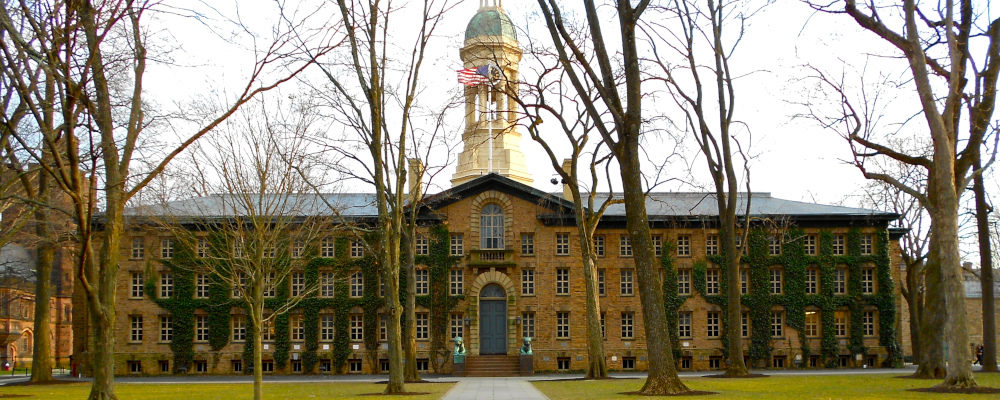I have been led to understand by the novels of F. Scott Fitzgerald that Princeton, in addition to being “the pleasantest country club in America” as Amory Blaine called it in This Side of Paradise, once boasted a serious academic tradition. James Madison, overwhelmed by the world beyond its ivied walls, refused to leave after graduation and spent an extra year supplementing his classical education with the study of Hebrew. The current university administration, alas, takes a dimmer but probably more realistic view of its students’ abilities. This week it announced that the study of Latin or Ancient Greek (to say nothing of Hebrew) would no longer be required of students in the Classics Department. Henceforth Princetonians will be able to boast a Classics degree earned, I assume, watching the miniseries I, Claudius, supplemented by their professors’ slide shows of visits to Delphi and the Parthenon and the latest polemic from Mary Beard. Their loss, but not their fault. That lies with the school boards that over the years phased classical languages out of the elementary and high school curriculum to make more room for — honestly, it’s not clear what for, lectures on self-esteem and more faculty meetings, I suppose. I wrote this short meditation on the loss of classical education before Princeton’s announcement, but the news gives me an excuse to pretend it is topical.
The fall of Rome is a famously overdetermined event, but the full extent of its decline is still shocking. For more than 1,000 years after the collapse of the Western Empire, the city was a small town, a provincial backwater of listless prelates in crumbling palaces. Its population, which had topped a million in AD 100, dwindled to less than 20,000. Well into the Renaissance, when Michelangelo was painting the Sistine Chapel, Rome was smaller than Medicine Hat.
A tourist transported back to the Rome of just 200 years ago would find the city almost unrecognizable. Where the forum is today, there would be a cow pasture — the “Campo Vaccino” — a jumble of ruins protruding here and there in grass. Until the archaeologist Carlo Fea “rediscovered” the forum in 1803, the heart of the imperial city lay half-buried, its grand ruins a quarry for new construction on a much more modest scale.
While the city was buried, Roman culture endured stubbornly. Roman law undergirded European civil codes; classical art and learning, preserved in Northern monasteries and Middle Eastern libraries, sparked a rebirth of culture during the Renaissance; and the Latin language continued to be the continental lingua franca until it was superseded by French in the 18th century. When the Hanoverian usurper George I arrived in England unable to speak to his new subjects, he communicated with his prime minister in halting Latin. And on Samuel Johnson’s one visit to the continent, he conversed with fellow scholars in a rather more fluent Latin, which he credited to the fact that “my master whipt me very well.”
Medieval Latin (a simplified and standardised academic version of the classical idioms) was the language of the law, of the universities, and, most importantly, of the church well into our era. A more modern Latin was used in the natural sciences into the 20th century, as zoological and botanical taxonomies remind us. Responsions, which included simple Latin and Greek questions, was a requirement for matriculation at Oxford and Cambridge until 1960. For a few years after that, the Latin liturgy remained exclusive in Catholic churches. And until recently, colloquial Latin could be heard on private school playgrounds (the cries of “Quis?” “Ego!” were still used at my elementary school in the late 1980s).
In a society that saw itself as part of a philosophical, political, and artistic tradition reaching back at least as far as Rome and Athens, as ours did until a generation or two ago, an understanding of these roots was not just preparation for a modern education, it was itself an education. It was not simply that without a classical education one could not fully understand ancient writers like Homer and Virgil or moderns like Dante, Camoes, or Shakespeare, or interpret most painting and sculpture; without them you could not fully understand the human condition. To philosophize without a basic understanding of Plato and Aristotle was not just ignorant, it was impossible.
The American revolution was so steeped in classical political thinking that many of the founders wrote under Latin pseudonyms like Publius, Cato, and Crito. The architecture of the new capital was classical, by way of Palladio (appropriately, and no doubt prophetically, Senator Thomas Gore once told his grandson Gore Vidal, that Washington “will make beautiful ruins”), which matched the design of the political system, with its Senate housed in the Capitol. Not for nothing are the two major American political parties called the Democrats and the Republicans. In some cases, the references are so familiar that we don’t even notice them: few people remark on Muhammad Ali’s curious birth name Cassius Marcellus Clay, Jr., or recognize the continuing popularity of distinctly Roman names like Marcus and Julius, especially among Black Americans.
The classical roots of our civilization run deeper than architecture and nomenclature. So many of the rules, patterns, and terminology of English grammar follow Latin that a solid grounding in the language covers most of the lessons now taught in elementary school English classes. Our literature, too, is so dependent on classical forms and sources that the well-whipt Johnson could say that “modern writers are the moons of literature; they shine with reflected light, with light borrowed from the ancients. Greece appears to me to be the fountain of knowledge; Rome of Elegance.” From Joyce’s Ulysses to André Alexis’s Fifteen Dogs, our culture continues to draw on classical references. I can’t imagine what it would be like to wander the Met, the National Gallery, or the Louvre with no understanding of classical or biblical references or Greek, Roman, and Hebrew texts.
The recent trend away from classical education — not just the Latin and Greek languages but the history, art, and literature in translation — denies children this cultural inheritance. It cuts them off from a world that cannot simply be looked up on their phones. You can’t google the Peloponnesian War, only a second- or third-hand precis, and looking up The Iliad online can tell you who the main characters were, but it’s like reading the Wikipedia entry for War and Peace and thinking you’ve got the gist of it. Literature must be read, closely, to be understood.
Classical languages and cultures used to be taught not because they were “elitist” or “exclusive,” but because they connected ignorant children to something bigger than their limited experiences. Among the many pernicious ideas in modern pedagogy, surely there is none worse than its impoverished notion of “relevance,” which turns the old idea of education upside down. When education experts today talk about “relevance,” they don’t mean the relevance of a work to a cultural tradition, but to the narrow scope of a child’s life. This is exactly backwards. The point of studying great works is not to shrink them to your frame of reference, but to expand your imagination to embrace them. It’s not enough to shrug and say that The Aeneid isn’t relevant to students today (as though a poetic epic set in a distant, mythologised Mediterranean world was any more “relevant” in that sense to children in Victorian London or, for that matter, to Roman children); it’s the job of a teacher to open and elevate their pupils’ minds to meet its greatness.
“The point of studying great works is not to shrink them to your frame of reference, but to expand your imagination to embrace them.”
It is sometimes objected that children today are too impatient to do the memory work required to learn classical languages, and that they are uninterested in the stories of Greece and Rome in translation. This is nonsense: memory expands with use. Show me a child who can recite hours of popular song lyrics or rattle off dialogue from their favourite movies and tv shows, and I’ll show you a child who, with inspired teaching, can conjugate irregular verbs and learn pages of Homer by heart. As for not believing children will be interested, if the stories that enthralled children for centuries suddenly do not appeal to today’s students, the fault doesn’t lie with either the stories or the students, but with the unimaginative grown-ups running the system.
A revival of classical learning, two generations after its abandonment, would pose a serious challenge today. To say that classical learning is important is an implicit rebuke to someone raised without it, which risks a backlash. “If I didn’t need to know it,” the thinking goes, “then why should anyone else learn it?” Two-and-a-half thousand years of cultural continuity runs smack into the defence-mechanism of the modern ego. As the Italian journalist Massimo Gramellini put it, referring to a Paris museum’s decision to stop using Roman numerals in its exhibits: “it is the perfect synthesis of the cultural catastrophe underway: first, things are not taught, and then they are eliminated so as not to make those who don’t know them feel uncomfortable.”
No one would accuse Harvard professor Cornel West of being a conservative, but he recently offered a vigorous, almost reactionary, antidote to this “cultural catastrophe,” In response to historically Black Howard University’s announcement that it was disbanding its Classics department, West and his co-author defended the Western Canon as “a conversation among great thinkers over generations that grows richer the more we add our own voices” and “an extended dialogue among the crème de la crème of our civilization about the most fundamental questions.” They noted that the emancipated Frederick Douglass “risked mockery, abuse, beating and even death to study the likes of Socrates, Cato and Cicero” and that the Rev. Martin Luther King Jr. was “similarly galvanized by his reading in the classics” and “mentions Socrates three times in his 1963 ‘Letter from Birmingham Jail.’”
This defence of the classics, with its implicit appeals to tradition and authority, is so common that it reads as cliché, but it apparently still has the power to shock radical sensibilities. Donna Zuckerberg’s (Mark’s sister), for one. Dr. Zuckerberg was until last year the editor of an avowedly progressive classics journal called Eidolon, where she found herself repeatedly embattled with a handful of internet “alt-right” personalities who have an affinity for classical imagery and stoic philosophy. So threatening did she find their celebration, or, in her words, “appropriation,” of certain classical tropes that it inspired her to write a book about the “problem” and, ultimately, disband her journal.
Zuckerberg was particularly alarmed by the idea that “we should study Classics because those who do not study history are doomed to repeat it [or] because Greece and Rome are important to study because they are at the foundation of Western civilization and culture.” This argument, the very same one advanced by Professor West (and the Rev. Dr. Martin Luther King, Jr. before him) was for Zuckerberg so redolent of incipient fascism that she dedicated Eidolon to correcting it by focusing on “scholars who write about race, gender, and class in the ancient world.” After several years of struggling in “a discipline that has historically been implicated in fascism and colonialism [and] continues to be enmeshed in white supremacy and misogyny,” Eidolon, like so many classical empires before it, eventually fractured into internal squabbles and ceased publication in December 2020.
“… we’ve done the work of the barbarians ourselves. We have sacked our own citadels, defiled our own temples, corrupted our own language, and severed ourselves from our own past.”
There is, of course, nothing wrong with exploring and explaining how the classical world really was and correcting popular misconceptions. That is the essential work of scholarship. But the inability to see the ancient world except through the filter of 21st century racial and sexual politics is betrayal of that mission, as is the insistence that what we have to say about the classical world is more important than what they have to say to us. And, if you are really concerned about a lack of diversity in the discipline, then the answer is to re-introduce classics into the standard curriculum, as some new charter schools have done. High schools and universities could also expand or “diversify” the field by including more Hebrew, Parthian, Sassanian, and early Byzantine languages and texts, and comparing them with the great works of other classical societies from India or China. Far from promoting mindless racialism, a revived and reinvigorated classical education would be an antidote.
In her book Boomers, Helen Andrews throws cold water on my hopes for such an educational revival, or at least explains why it would be a counter-cultural struggle. Having squandered their own mostly traditional education, the boomers pulled up the drawbridge on the next generation. “To cover their tracks,” Andrews writes, “the boomers have stuffed their heirs with sufficient pseudo-knowledge to make them feel as if they know enough about the past to judge themselves superior to it.” Any attempt to reverse that process will meet with strong pushback from the generation now in charge, which measures relevance and importance in education by what little they already know.
It seems we are doomed to emulate the Romans after all, not at their height but in the centuries after the barbarians sacked their cities, when they could only stare dumbly at the colossal statuary around them and pillage ancient monuments to meet immediate needs.
Except, in our case, we’ve done the work of the barbarians ourselves. We have sacked our own citadels, defiled our own temples, corrupted our own language, and severed ourselves from our own past. We have rejected a body of wisdom that carried us to the edge of yesterday, and now have no choice but to deny that it matters.
The logic of our ignorance means we must rebury Rome and forget it again until the next Renaissance. If there is any hope before then, it lies with a few reactionaries who, as Dávila described them, are not “dreamers of abolished pasts,” but “hunters of sacred shades on the eternal hills.” In this case, on the Judean Hills, the Acropolis, and the Seven Hills of Rome.




